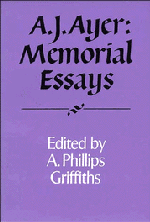Book contents
- Frontmatter
- Contents
- Preface
- A Defence of Empiricism
- Ayer: the Man, the Philosopher, the Teacher
- Ayer's Place in the History of Philosophy
- AYER'S ATTACK ON METAPHYSICS
- Ayer and World Views
- Language, Newspeak and Logic
- On the relation between Common Sense, Science and Metaphysics
- Logical Positivism and Intentionality
- Probability and the Evidence of our Senses
- Seeing Qualia and Positing the World
- Three Varieties of Knowledge
- The Importance of ‘If’
- Ayer's Ethical Theory: Emotivism or Subjectivism?
- Subjectivism and Toleration
- An Interview with A. J. Ayer
- Notes on Contributors
- References
- Index
An Interview with A. J. Ayer
Published online by Cambridge University Press: 01 July 2010
- Frontmatter
- Contents
- Preface
- A Defence of Empiricism
- Ayer: the Man, the Philosopher, the Teacher
- Ayer's Place in the History of Philosophy
- AYER'S ATTACK ON METAPHYSICS
- Ayer and World Views
- Language, Newspeak and Logic
- On the relation between Common Sense, Science and Metaphysics
- Logical Positivism and Intentionality
- Probability and the Evidence of our Senses
- Seeing Qualia and Positing the World
- Three Varieties of Knowledge
- The Importance of ‘If’
- Ayer's Ethical Theory: Emotivism or Subjectivism?
- Subjectivism and Toleration
- An Interview with A. J. Ayer
- Notes on Contributors
- References
- Index
Summary
Ted Honderich: Professor Ayer, you wrote Language, Truth and Logic when you were only twenty-four, in 1935, and achieved fame by way of it. Tell us a bit about the writing.
A. J. Ayer: After I ‘d taken my Schools at Oxford—I read Greats—my tutor Gilbert Ryle suggested that I go away for a couple of terms. I had already been appointed Lecturer at Christ Church, and I wanted to go to Cambridge to study under Wittgenstein, but Gilbert said no, don't do that. We've got a lot of people going to Cambridge and we've a vague idea of what Wittgenstein is up to, but I believe something very interesting is happening in Vienna, under Moritz Schlick. Why don't you go to Vienna?
I'd just got married for the first time, and I thought Vienna would be a nice place to go to for a honeymoon. At this point I didn't speak much German, but I thought I'd pick up some, which I did, and so I went and worked with the Vienna Circle. I couldn't really take much part in their debates, but I understood what was going on and came back very enthusiastic about what they were doing. They were extremely empiricist, very anti-metaphysical, anti-religious, and this suited my cast of mind very much. I immediately started lecturing at Oxford on—I think it was Russell, Wittgenstein and Quine. Russell was at that time almost a forbidden subject at Oxford, and Wittgenstein and Quine were people who'd not been heard of.
- Type
- Chapter
- Information
- A. J. Ayer: Memorial Essays , pp. 209 - 226Publisher: Cambridge University PressPrint publication year: 1992
- 2
- Cited by



